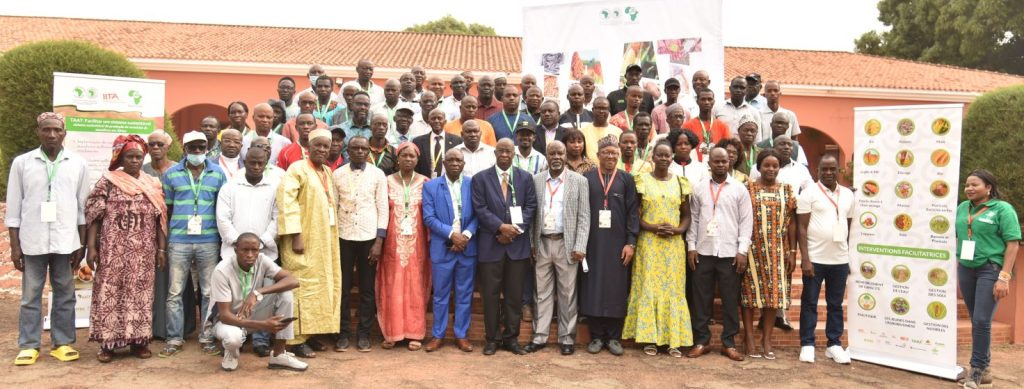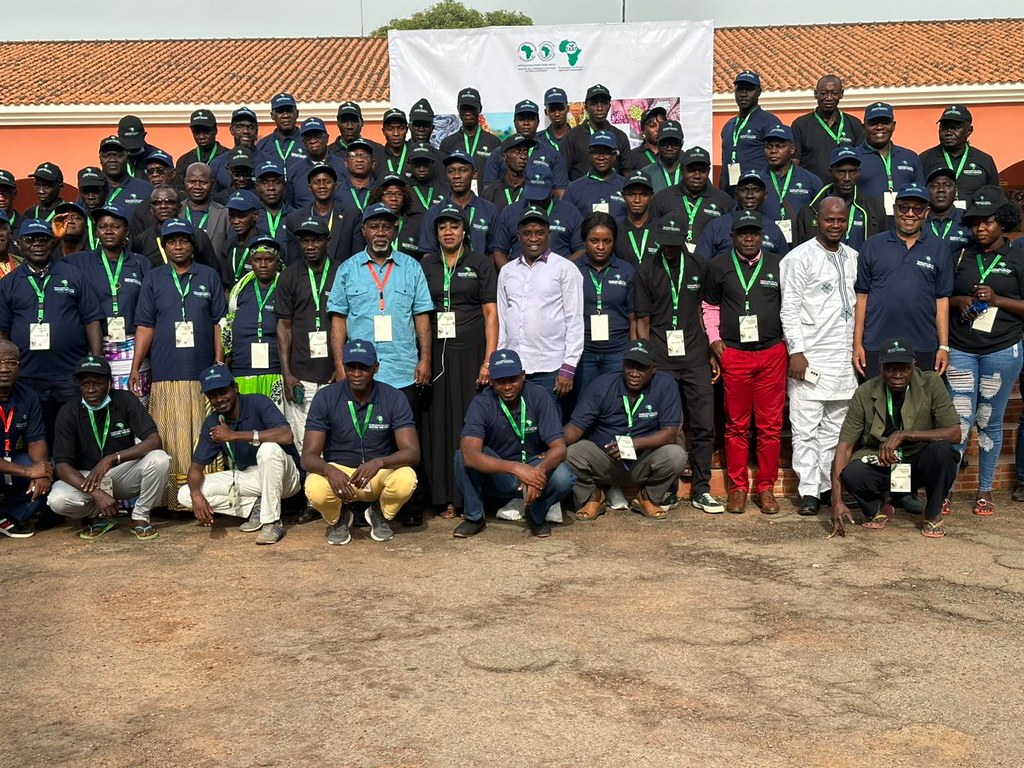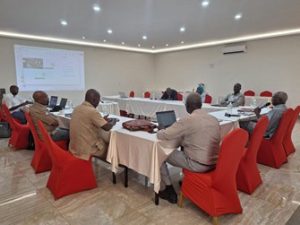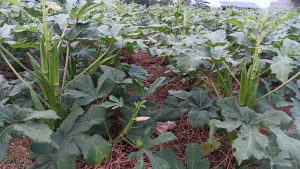Guinea-Bissau: TAAT engages Stakeholders on Cassava Value Chain development

Bordered by Senegal to the north and Guinea to the south, Guinea-Bissau includes an archipelago of more than 100 islands and has a population of 1.8 million.
Agriculture is central to the country’s economy as two crops dominate: rice for domestic consumption and cashew nuts, which generate 95 per cent of the country’s exports, as a cash crop. Cassava, grown across the country, is yet to record significant strides as production capacity and developments along the value chain remain low.
To address these challenges, Technologies for African Agricultural Transformation (TAAT) in collaboration with Guinea-Bissau’s National Agricultural Research Institute (INPA), and the World Food Programme (WFP), held a three-day capacity-building workshop aimed at bolstering the establishment and fortification of Agricultural Innovation Platforms (IPs) for the Cassava Value Chain in the country.
The workshop, held from the 18th to the 21st of December 2023 in Bissau, brought together experts and stakeholders, including 90 national farmers and technicians from diverse public and private institutions.
Other participants were drawn from the Directorate General of Agriculture (DGA), Directorate General of Agricultural Planning (DGPA), Directorate General of Rural Engineering (DGEDR), Regional Directorate of Agriculture (DRA), Directorate of Agricultural Extension Services (DSVA), Directorate of Seed Control and Certification Service (DSCCS), Ministry of Agriculture and Rural Development (MADR), Project to support the economic development of the southern regions (PADES), and the National Agricultural Research Institute.
In a keynote address, the Guinea Bissau Minister of Agriculture, Forestry and Rural Development highlighted the link between the workshop’s objectives and ongoing efforts at empowering farmers and technicians to boost the country’s root and tuber production, specifically cassava.
Represented by Engr João Aruth, President of the National Agricultural Research Institute (INPA), the minister expressed hope that the workshop’s outcome will respond to the nation’s declining food crop production and rising food insecurity, especially in rural areas. The Minister further acknowledged the agricultural sector’s struggles and expressed optimism that the workshop will proffer and build the requisite capacity that will be crucial in reviving root and tuber production, and ultimately aide the fight against food and nutritional insecurity Guinea-Bissau.
Engr Danilson Correia, of the World Food Programme office in Guinea-Bissau welcomed the initiative and pledged their WFP’s support to the government’s agricultural policies, particularly in reviving cassava production.
The capacity building workshop featured an overview of the strategic plan for cassava production in Guinea-Bissau, the concept of the Cassava Innovation Platform (IP), stakeholder collaboration for increased cassava production, TAAT’s role in improving cassava production methods and quality, and modern machinery needs for cassava in Guinea-Bissau.
Other sessions showcased cassava processing technologies, including mobile processing units, the nutritional value and safety aspects of cassava, the Semi Autotrophic Hydroponics (SAH) technique for disease-free cassava propagation, traditional cassava production methods and the selection of market-relevant varieties, pest and disease management, seed system development, and value chain mapping.
The final day of the three-day event featured practical sessions on High-Quality Cassava Flour (HQCF) flour in food production, integrating the Agribusiness Learning Alliance, and promoting entrepreneurship and market focus. The session ended with group work on identifying cassava value chain challenges and proposing solutions.
In his closing remarks, Dr Adebayo Abass, the TAAT Cassava Compact Leader, affirmed that the workshop successfully empowered stakeholders in Guinea-Bissau to establish and strengthen cassava innovation platforms. “By promoting collaboration, knowledge exchange, and new technologies, this initiative holds promise for increased cassava production, improved food security, and economic development in the country,” Dr Abass said.
According to Dr Abass, cassava seed growers can use the SAH technique to produce large quantities of high-quality foundation seeds quickly. “This is critical to establishing a formal seed system for cassava in any country to achieve increased yields and improved food and nutritional security. This workshop has strengthened the capacity of participants in critical elements of cassava production, safety, processing, storage, and the requisite quality standards.
The workshop, according to Dr Abdulrazak Ibrahim, the TAAT Capacity Development and Technology Outreach Compact (CDTO) Leader, aligns with the Forum for Agricultural Research in Africa (FARA)‘s IP framework. “FARA, at the forefront of TAAT’s CDTO Enabler Compact, strategically employs IPs as operational tools to advance the goals of the Feed Africa Initiative within the Integrated Agricultural Research for Development (IAR4D) framework,” he said.
Dr Ibrahim added that the TAAT CDTO Compact supports all TAAT commodity Compacts by strengthening capacities and accelerating technology outreach. “IPs are platforms that bring together stakeholders from different sectors to share knowledge, learn from each other, and develop innovative solutions to agricultural challenges,” he added.
Organised jointly by the TAAT Cassava Compact and the TAAT CDTO led by the International Institute of Tropical Agriculture (IITA) and FARA, respectively, the CDTO Compact works with the Cassava Compact to strengthen the capacity of institutions in selected countries, including Guinea Bissau, to better support the farmers and other cassava value chain actors regarding market access and profitability. This includes targeted capacity building to equip the actors with the skills needed to establish and operate IPs in the cassava value chain, thereby contributing to the overall development of the value chain in Africa.
The workshop received support from a team of seasoned trainers and facilitators from IITA and FARA. These included Engr Thierno Diallo, Dr. Najimu Adetoro, Dr. Sikirou Mouritala, Dr. Apollin Fotso, Ms Angelique Cikuru, Ms Doline Matempa, Ms Karen Munoko, and Mr Benjamin Abugri.
Recent Stories
Related Stories
- Gabon: TAAT and Partners Reinforce Cassava and Plantain Seed Systems
- TAAT spearheads new drive to unlock South Sudan’s agricultural potential
- TAAT: Intensifying cassava production in Guinea, the Central African Republic, and Guinea-Bissau.
- Guinea-Bissau: TAAT holds TOT Workshop on Vegetable Seed Production
- Sierra Leone: TAAT holds training and sensitisation sessions for Agrodealers, Youths and IP Networks





